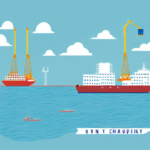Understanding the Power of Attorney in Supply Chain Management
In today's dynamic business landscape, the significance of supply chain management cannot be overstated. A well-structured supply chain process ensures that companies meet their customers' needs efficiently and effectively. One of the critical elements of effective supply chain management is the utilization of a power of attorney (POA).
What is a Power of Attorney and How Does it Work in Supply Chain Management?
A power of attorney is a legal document that authorizes an individual or entity to act on another's behalf in specific matters. In the context of supply chain management, a POA empowers the designated person or entity to conduct various business transactions related to the supply chain process, such as signing contracts, paying bills, and negotiating with suppliers or customers.
By delegating these responsibilities, businesses can ensure continuity and efficiency, especially in scenarios where key personnel are unavailable or when dealing with international suppliers. For instance, a POA can facilitate smooth operations when managing suppliers abroad, reducing delays and enhancing responsiveness.
The scope of a POA can vary from limited to broad, depending on the business needs. A limited POA might authorize actions for a specific transaction, while a general POA grants comprehensive authority over the entire supply chain process. It is crucial to define the scope clearly to align with your business objectives and mitigate potential risks.
The Legal Requirements for Granting a Power of Attorney in Supply Chain Management
To ensure that a POA is legally binding, certain requirements must be met:
- Sound Mind: The principal granting the POA must be of sound mind and fully understand the legal implications of the document.
- Notarization: The POA must be signed in the presence of a notary public to validate its authenticity.
- Specificity: Clearly delineate the powers being granted to avoid ambiguity and potential misuse.
Additionally, it's advisable to consult with legal professionals to draft the POA, ensuring it complies with relevant laws and adequately protects your business interests. According to a [2023 report by the American Bar Association](https://www.americanbar.org), properly executed POAs can significantly streamline business operations and reduce legal complications.
The Different Types of Power of Attorney Used in Supply Chain Management
Several types of POAs can be utilized in supply chain management:
- General Power of Attorney: Grants broad authority to act on behalf of the principal in all matters specified within the document.
- Special Power of Attorney: Limits the authority to specific tasks, such as signing a particular contract or managing a specific shipment.
- Springing Power of Attorney: Becomes effective only when certain conditions are met, such as the principal's incapacity.
- Durable Power of Attorney: Remains in effect even if the principal becomes incapacitated, ensuring continuous management of supply chain operations.
Choosing the appropriate type depends on the level of control and flexibility your business requires. For instance, a durable POA might be ideal for long-term supply chain projects, while a special POA could be suitable for one-time transactions.
How to Choose the Right Person to Grant a Power of Attorney for Your Business
Selecting the right individual or entity to hold POA is crucial for the integrity of your supply chain operations. Consider the following factors:
- Trustworthiness: The authorized person must be reliable and act in the best interests of your business.
- Expertise: They should possess the necessary skills and knowledge to handle supply chain tasks effectively.
- Availability: Ensure they have the time and resources to dedicate to their responsibilities.
- Conflict of Interest: Verify that they do not have relationships that could compromise their impartiality.
It may also be beneficial to establish a written agreement outlining roles and expectations. According to [Supply Chain Management Review](https://www.scmr.com), clear delegation of authority can enhance operational efficiency and reduce managerial burdens.
Understanding the Limitations and Risks Associated with Granting a Power of Attorney in Supply Chain Management
While POAs offer significant advantages, they also come with inherent risks:
- Unauthorized Actions: The authorized individual may exceed their granted powers, leading to potential misuse.
- Conflicts of Interest: Personal interests of the authorized party may conflict with business objectives.
- Lack of Oversight: Without proper monitoring, unauthorized or inefficient actions might go unnoticed.
To mitigate these risks, implement stringent oversight mechanisms and clearly define the scope of authority within the POA. Regular audits and transparent communication channels are essential to maintain control and ensure alignment with business goals.
The Benefits of Using a Power of Attorney in Managing Your Supply Chain
Implementing a POA in supply chain management offers numerous benefits:
- Operational Efficiency: Delegates tasks to capable individuals, allowing management to focus on strategic initiatives.
- Flexibility: Enables swift decision-making, especially in time-sensitive situations.
- Scalability: Facilitates expansion into new markets by authorizing local representatives to handle operations.
- Continuity: Ensures that supply chain activities continue seamlessly in the principal's absence.
According to a [2022 study by Deloitte](https://www2.deloitte.com), businesses leveraging POAs experience a 20% increase in supply chain responsiveness and a 15% reduction in operational bottlenecks.
Practical Examples of How to Use a Power of Attorney in Supply Chain Management
POAs can be applied in various supply chain scenarios, including:
- Contract Negotiation: Authorizing representatives to negotiate and finalize terms with suppliers.
- Customs Handling: Managing customs documentation and clearance processes for international shipments.
- Financial Transactions: Handling payments, invoicing, and financial reconciliations on behalf of the business.
- Dispute Resolution: Addressing and resolving conflicts with suppliers or customers efficiently.
For example, a POA can empower a logistics manager to sign necessary shipping documents, ensure timely deliveries, and handle any arising issues without constant oversight, thereby streamlining operations.
How to Revoke or Amend a Power of Attorney in Supply Chain Management
Revoking or amending a POA involves several steps to maintain legal integrity:
- Draft a Revocation Document: Clearly state the intention to revoke or amend the existing POA.
- Notify All Parties: Provide copies of the revocation to the authorized individual and any third parties affected, such as suppliers or financial institutions.
- Legal Compliance: Ensure that the revocation complies with local laws and is notarized if required.
- Update Records: Maintain updated records to reflect the changes and prevent unauthorized actions.
Failure to properly revoke a POA can result in unauthorized actions and potential legal disputes. It's advisable to consult with legal professionals to navigate the revocation or amendment process effectively.
Legal Considerations When Dealing With Third-Party Suppliers Using a Power of Attorney
When third-party suppliers are authorized to act on your behalf via a POA, several legal considerations must be addressed:
- Clear Scope: Define the extent of authority granted to third-party suppliers to prevent overreach.
- Compliance: Ensure that all actions taken by the suppliers comply with relevant laws and regulations.
- Liability: Understand the liabilities involved and ensure that the POA protects your business interests.
- Documentation: Maintain thorough records of all transactions and communications involving third-party suppliers.
Establishing robust legal frameworks when engaging third-party suppliers through a POA can safeguard your business against potential legal and operational risks.
The Importance of Proper Documentation When Granting or Using a Power of Attorney in Supply Chain Management
Accurate and comprehensive documentation is vital when granting or utilizing a POA:
- Legal Validity: Ensures that the POA is enforceable and recognized in legal proceedings.
- Clarity: Clearly outlines the powers granted, reducing the likelihood of misunderstandings.
- Accountability: Facilitates monitoring and auditing of the authorized individual's actions.
- Dispute Resolution: Provides a clear reference in case of disputes or discrepancies.
Proper documentation practices not only enhance operational efficiency but also provide legal protection for your business. Implementing standardized documentation protocols can streamline the POA process and ensure compliance with legal requirements.
Common Mistakes to Avoid When Using a Power of Attorney in Your Supply Chain Operations
To maximize the benefits of using a POA in supply chain management, be aware of and avoid the following common mistakes:
- Vague Scope: Failing to clearly define the powers granted can lead to misuse or overstepping of authority.
- Lack of Oversight: Not monitoring the activities of the authorized individual can result in unauthorized actions.
- Inadequate Documentation: Poorly documented POAs can lead to legal disputes and operational inefficiencies.
- Neglecting Updates: Failing to update or revoke POAs when business needs change can pose risks.
By avoiding these pitfalls, businesses can effectively leverage POAs to enhance supply chain operations while minimizing associated risks.
Conclusion
The power of attorney is a powerful tool in managing and optimizing your supply chain operations. It offers numerous benefits, including increased operational efficiency, flexibility, and continuity. However, it's essential to understand the legal requirements, define the scope clearly, and implement proper oversight mechanisms to mitigate associated risks.
By carefully selecting trustworthy and competent individuals or entities, maintaining thorough documentation, and avoiding common mistakes, businesses can effectively utilize POAs to streamline their supply chain processes and achieve their strategic objectives.
For more insights and tools on optimizing your supply chain management, visit ShipScience.






















